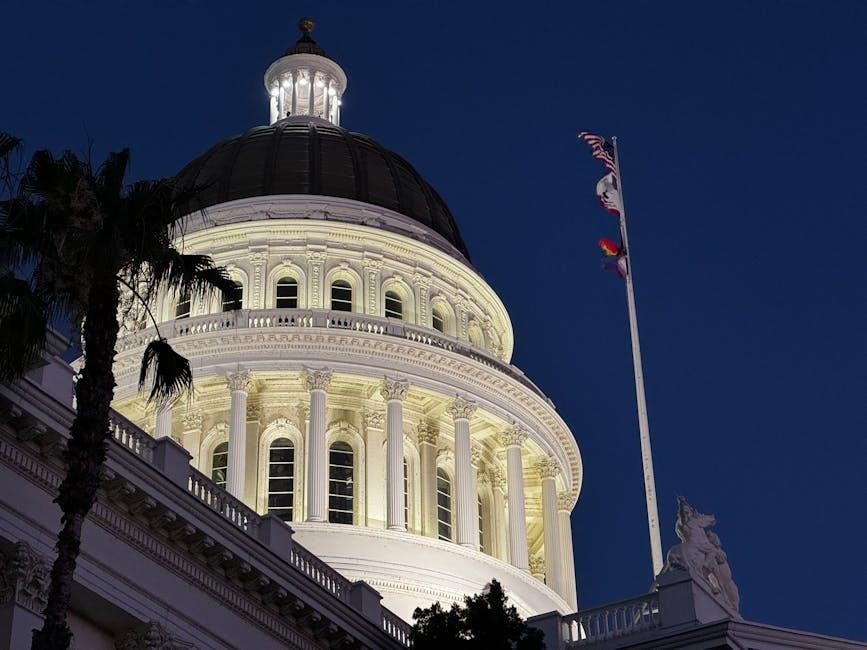how does public administration impact our lives pdf
Discover how public administration shapes your daily life in our free PDF guide. Explore real-world examples and expert insights to understand its impact better.
Public administration significantly impacts daily life by ensuring access to essential services‚ promoting transparency‚ and addressing societal challenges‚ thereby enhancing community well-being and governance effectiveness․
1․1․ Definition and Scope of Public Administration
Public administration refers to the implementation of government policies and management of public programs․ It encompasses a broad scope‚ including healthcare‚ education‚ and public safety‚ ensuring equitable access to essential services․ Its role extends to policy formulation‚ resource allocation‚ and oversight‚ aiming to improve societal well-being while maintaining transparency and accountability in governance processes․
1․2․ The Impact of Public Administration on Daily Life
Public administration directly influences daily life by managing essential services like education‚ healthcare‚ and public safety․ It ensures access to resources‚ implements policies‚ and responds to emergencies‚ fostering a stable and functional society․ Effective public administration enhances quality of life‚ supports community development‚ and addresses societal challenges‚ making it indispensable for maintaining order and improving well-being․

Public Administration in Healthcare Systems
Public administration ensures access to quality healthcare services‚ shapes policies‚ and regulates systems to improve health outcomes and equity‚ addressing societal needs effectively and efficiently always․
2․1․ Ensuring Access to Quality Healthcare Services
Public administration plays a crucial role in ensuring access to quality healthcare by implementing policies‚ allocating resources‚ and regulating services․ It works to reduce disparities‚ improve affordability‚ and enhance healthcare delivery systems‚ ensuring equitable access for all individuals‚ regardless of socioeconomic status‚ while addressing emerging health challenges and promoting overall well-being effectively․
2․2․ Policy-Making and Regulation in Healthcare
Public administration shapes healthcare through policy-making and regulation‚ ensuring compliance with standards and promoting evidence-based practices․ By drafting and enforcing laws‚ it safeguards patient rights‚ controls costs‚ and maintains service quality․ Effective regulation fosters trust and accountability‚ enabling healthcare systems to adapt to evolving needs and technologies‚ ultimately improving public health outcomes and ensuring equitable care delivery․
The Role of Public Administration in Education
Public administration ensures access to quality education by managing resources‚ implementing policies‚ and overseeing infrastructure development‚ thereby fostering learning opportunities and societal development․

3․1․ Providing Educational Resources and Infrastructure
Public administration plays a crucial role in delivering educational resources and infrastructure‚ ensuring schools are equipped with necessary tools and facilities․ This fosters an environment conducive to learning‚ enabling students to achieve their full potential․ By managing budgets and implementing policies‚ administrators ensure equitable access to education‚ bridging gaps and promoting long-term societal growth and development effectively․
3․2․ Shaping Educational Policies for Equity and Accessibility
Public administration plays a pivotal role in designing and implementing educational policies that promote equity and accessibility․ By addressing systemic inequalities and ensuring resources reach marginalized communities‚ administrators help create inclusive learning environments․ Policies are crafted to bridge educational gaps‚ fostering opportunities for all students‚ regardless of background‚ to thrive academically and socially․
Public Safety and Emergency Services
Public administrators ensure community safety by managing law enforcement‚ disaster response‚ and emergency services‚ safeguarding lives and property while maintaining order and preparedness for crises․
4․1․ Law Enforcement and Crime Prevention
Public administration plays a crucial role in law enforcement by implementing strategies to prevent crime‚ maintain order‚ and protect citizens․ Through effective policy-making and oversight‚ administrators ensure that law enforcement agencies operate efficiently‚ addressing community safety concerns and upholding justice․ Data-driven approaches and community engagement are key to reducing crime rates and fostering trust between law enforcement and the public‚ ensuring a safer society․ Public administrators also work to allocate resources and train personnel‚ enhancing the overall effectiveness of crime prevention efforts․
4․2․ Disaster Response and Management
Public administration is vital in disaster response‚ ensuring coordinated efforts to protect lives and property․ Administrators develop emergency plans‚ allocate resources‚ and collaborate with agencies to provide aid․ Effective communication and transparent decision-making are critical during crises․ By leveraging technology and data‚ public administrators enhance disaster preparedness and recovery‚ supporting communities in rebuilding and addressing long-term needs‚ thus fostering resilience and stability․

Infrastructure Development and Maintenance
Public administration ensures the planning‚ funding‚ and maintenance of infrastructure‚ such as roads‚ public utilities‚ and transportation systems‚ enabling connectivity and supporting economic growth and sustainability․
5․1․ Transportation Systems and Urban Planning
Public administration oversees the development and maintenance of transportation systems‚ ensuring efficient mobility and connectivity․ Urban planning initiatives create livable cities‚ balancing growth with sustainability․ Effective transportation networks enhance economic productivity and quality of life‚ while strategic urban planning addresses population needs‚ fostering inclusive and environmentally sustainable communities․ These efforts are vital for modern society’s functionality and future resilience․
5․2․ Public Utilities and Essential Services
Public administration ensures the reliable delivery of essential services like water‚ electricity‚ and waste management․ It manages utilities to maintain affordability and accessibility‚ safeguarding public health and quality of life․ Effective governance of these services fosters community well-being‚ supports economic activities‚ and promotes sustainable development‚ making them indispensable to modern society’s functioning and resilience․

Economic Development and Public Administration
Public administration drives economic growth by supporting local businesses‚ creating jobs‚ and implementing policies that foster innovation and stability‚ enhancing community prosperity and quality of life․
6․1․ Supporting Local Businesses and Industry
Public administration plays a crucial role in fostering economic development by supporting local businesses and industries through funding‚ policies‚ and infrastructure development․ By creating job opportunities and stimulating innovation‚ public administrators help communities thrive‚ ensuring sustainable economic growth and reducing unemployment․ These efforts not only enhance local economies but also contribute to overall societal well-being and prosperity․
6․2․ Job Creation and Employment Programs
Public administration drives economic growth by implementing job creation initiatives and employment programs‚ reducing unemployment‚ and fostering economic stability․ These programs often involve partnerships with local businesses and educational institutions to provide job training‚ ensuring workers acquire skills needed for emerging industries․ By addressing workforce needs‚ public administrators contribute to sustainable community development and improved quality of life for citizens;
Social Justice and Equality in Public Administration
Public administration promotes social justice by addressing inequality‚ ensuring equitable access to services‚ and implementing policies that foster fairness and inclusion in society․
7․1․ Addressing Inequality Through Policy
Public administration crafts policies to reduce systemic inequality‚ ensuring fair access to education‚ healthcare‚ and economic opportunities․ By addressing disparities‚ these policies promote equity and social cohesion‚ fostering inclusive communities where all individuals can thrive and contribute meaningfully to society․
7․2․ Ensuring Access to Social Services

Public administration plays a crucial role in ensuring access to social services like healthcare‚ education‚ and welfare programs․ By managing resources effectively‚ it bridges gaps for marginalized communities‚ ensuring equitable access and improving overall quality of life‚ thus fostering a more inclusive and supportive society for all individuals․
Environmental Sustainability and Public Administration
Public administration drives environmental sustainability by implementing green policies‚ managing resources‚ and promoting climate action‚ ensuring a healthier planet and sustainable future for society․
8․1․ Implementing Environmental Policies
Public administration plays a crucial role in executing environmental policies through regulations‚ enforcement‚ and stakeholder engagement․ By implementing laws and international agreements‚ governments ensure sustainable resource management and climate action․ These efforts reduce carbon footprints‚ protect ecosystems‚ and promote renewable energy‚ fostering a greener future while ensuring public participation in environmental decision-making processes․
8․2․ Promoting Green Initiatives and Climate Action
Public administration drives environmental sustainability by promoting green initiatives and climate action․ Through funding eco-friendly projects‚ educating communities‚ and enforcing regulations‚ governments reduce carbon footprints․ These efforts foster renewable energy adoption‚ waste reduction‚ and conservation․ By engaging stakeholders‚ public administrators ensure inclusive climate strategies‚ benefiting both current and future generations while addressing global environmental challenges effectively․

The Importance of Transparency and Accountability

Public administration ensures transparency and accountability‚ building trust and ensuring responsible governance․ Open processes and oversight mechanisms hold officials accountable‚ fostering integrity and public confidence․
9․1․ Ensuring Government Transparency
Public administration ensures government transparency by promoting open data‚ public records access‚ and accountability measures․ This fosters trust‚ reduces corruption‚ and enables citizens to monitor governmental actions effectively․
9․2․ Holding Public Officials Accountable
Public administration ensures accountability by implementing audits‚ performance evaluations‚ and transparency measures; This includes monitoring official actions and ensuring compliance with laws and ethical standards․ Accountability fosters trust in governance and ensures that public resources are used effectively and responsibly‚ promoting integrity and responsiveness in government operations․
The Role of Technology in Modern Public Administration
Technology enhances public administration by improving efficiency‚ transparency‚ and decision-making․ It enables digital governance‚ data-driven policies‚ and innovative solutions‚ ensuring better public service delivery and accountability․
10․1․ Digital Governance and E-Government
Digital governance and e-government transform public administration by enhancing service delivery through online platforms․ They improve transparency‚ accountability‚ and citizen engagement‚ enabling efficient access to information and services․ E-government tools streamline processes‚ reduce bureaucracy‚ and ensure data integration‚ fostering a more responsive and inclusive governance framework for modern societies․
10․2․ Leveraging Data for Informed Decision-Making
Public administration leverages data to enhance decision-making‚ improving policy formulation and service delivery․ By analyzing data‚ officials can identify trends‚ allocate resources efficiently‚ and address societal challenges effectively․ This approach ensures transparency‚ accountability‚ and evidence-based governance‚ enabling better outcomes in healthcare‚ education‚ and public safety while addressing inequalities and ensuring equitable resource distribution for all community members․

Global Challenges and the Future of Public Administration
Public administration addresses global issues like poverty and pandemics while adapting to future trends‚ ensuring innovative solutions for societal challenges and fostering sustainable development worldwide․

11․1․ Addressing Global Issues Like Poverty and Pandemics
Public administration plays a pivotal role in tackling global challenges such as poverty and pandemics by implementing policies‚ allocating resources‚ and collaborating with international organizations to ensure equitable solutions․
11․2․ Adapting to Future Trends and Innovations
Public administration must evolve to address future challenges by embracing technological advancements and innovative strategies․ Leveraging data analytics‚ digital governance‚ and sustainable practices ensures adaptive and resilient solutions․ By fostering collaboration and continuous improvement‚ public administrators can effectively navigate global trends‚ enhancing service delivery and societal well-being in a rapidly changing world․

